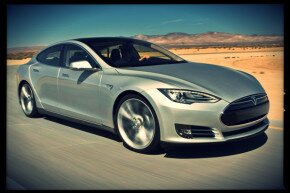US Department of Energy launches program to promote EV charging at work
 |
The US Department of Energy has teamed up with automakers and several other companies to boost the number of office-based charging stations tenfold within the next five years, in order to help make electric vehicles more popular.
The department’s Workplace Charging Challenge aims to help make electric vehicles more attractive and convenient to employees. It’s part of President Barack Obama’s EV Everywhere Grand Challenge — a 10-year program to accelerate the development and commercialization of EVs, while, at the same time, decreasing the country’s dependence on foreign oil.
“The market for electric vehicles is expanding dramatically, giving drivers more options to save money on gasoline while reducing carbon pollution,” Energy Secretary Steven Chu said in a statement. “These 13 companies are taking strong steps to make charging infrastructure more broadly available to their work force — setting an example for others to follow and helping America lead the global race for a growing industry.”
The companies participating in the program include the Detroit 3, Tesla Motors, Nissan Motor Co., Google, General Electric, 3M, Duke Energy, Eli Lilly and Co., San Diego Gas & Electric, Siemens and Verizon.
The DOE is not providing financial incentives to participants in the program.
Consumer demand for the newest EVs has been tepid in part because of high prices, range anxiety, inconvenience and an inadequate number of charging outlets.
While some automakers are shifting their focus away from electric vehicles in favor of fuel-cell, hydrogen-powered vehicles, as well as concentrating on refinements of the internal combustion engine, the industry isn’t pulling the plug on electric cars.
“We remain 100 percent commited to our EV strategy,” Nissan spokesman Travis Parman said, referencing the company’s recent deal to collaborate with Daimler and Ford of fuel cell advances.
Nissan announced plans last week to build at least 500 charging stations over the next 18 months, including a network of level 2 — 240 volts — and direct current fast-chargers. At 40 so-called eVgo Freedom Station sites, which, as part of a charging network created by New Jersey utility NRG Energy, the Nissan Leaf can be charged to 80 percent of capacity in less than 30 minutes.
“We already have a robust charging infrastructure in place, a lot of which is solar-generated energy,” Parman said. “One of the key opportunties is working with a number of companies to create more workplace campus charging stations.”
Nissan is working with a number of commercial charging partners to bolster EV infrastructure, including NRG, EV Project, Car Charging Group and AeroVironment.
Nissan has approximately 160 public fast-chargers in the United States.
General Motors spokesman Alan Adler said the automaker currently offers 239 charging stations at work facilities across the United States, in addition to over 300 units for development work and testing.
“We sold more than 23,000 Chevy Volts last year, so public charging is something we are on board with. You want to have public charging for convenience purposes and for people to adopt electrification,” Adler said.
GM recently began selling the Chevrolet Spark EV and is shifting its efforts to additional public charging outlets.
“The Volt doesnt need to be charged every day. So our focus has largely been on home charging. Public charging is important, especially now since we are bringing the Chevy Spark EV on the market,” Adler said, “but we want to promote being more green. Electrication is a priority for propulsion technology.”
Verizon spokesman John Columbus said the company, which has several EV charging stations at company sites, including in California, New Jersey, Massachusetts, Washington, D.C. and Verizon’s headquarters in New York City, looks at the Energy department’s initiative as an efficient way to award employees who are making eco-friendly choices.
“Companies set an example and make a commitment by installing these charging stations where their employees come to work,” Columbus said. “You start building up a national infrastructure through corporations and enterprises.”
In a company survey, 80 percent of Verizon employees said they would be more interested in purchasing an electric vehicle if they had a place to charge it at the office. “We are surveying locations to see which place would get the best use out of this,” Columbus said.
San Diego Gas and Electric spokeswoman Gina Jacobs said the company is installing a solar carport with 10 new chargers, featuring eight level 1 [120 volts] and two level 2 chargers for employees. Jacobs said more than 35 SDGE employees own PEVs.
“It’s part of the culture over here. Of the passenger vehicles in our fleet, 86 percent are alternative-fuel vehicles,” Jacobs said.












